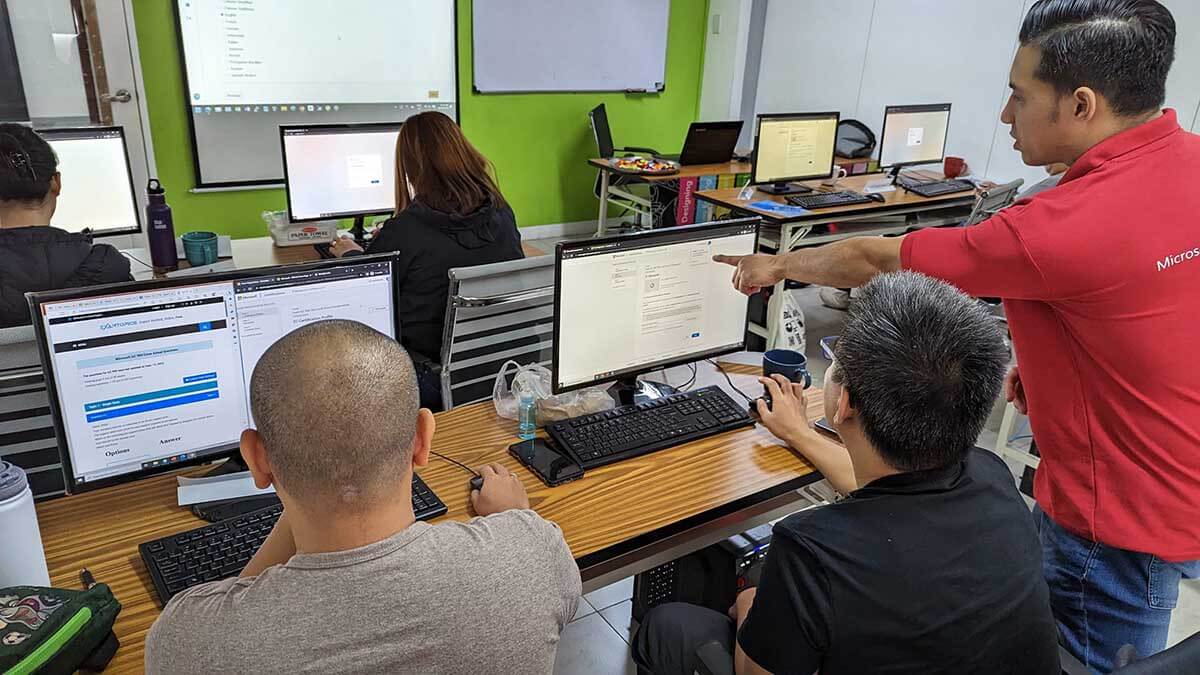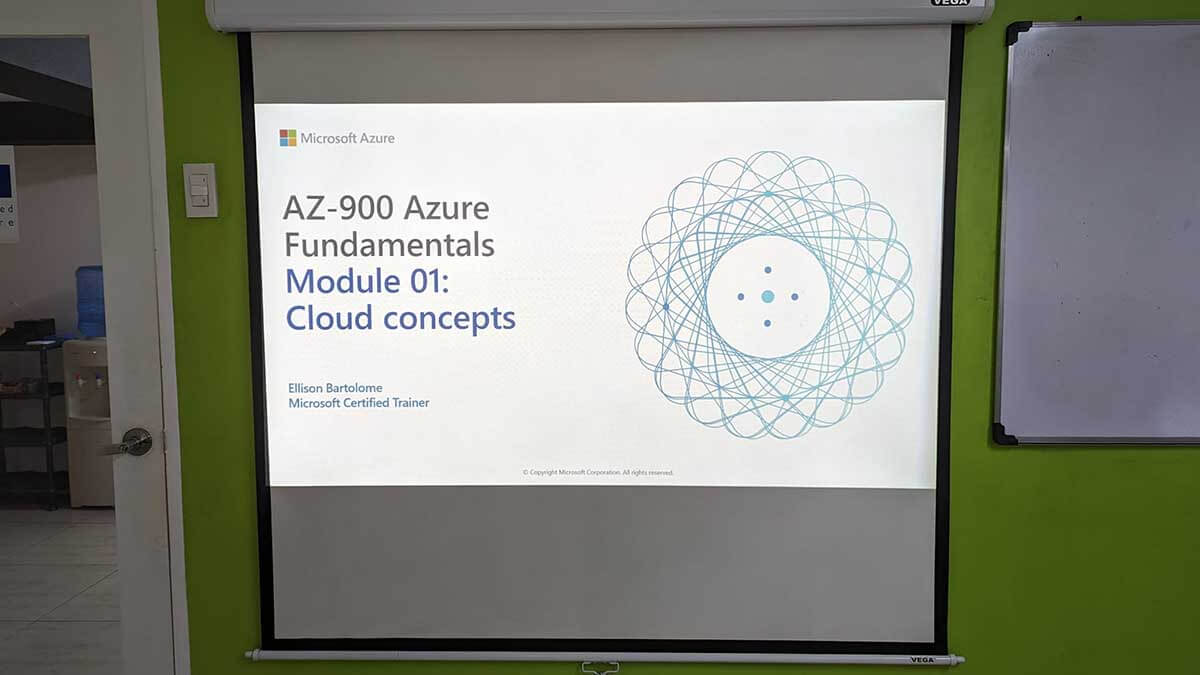Microsoft Azure Administrator
Certification Exam: AZ-104

Course Overview
Join our comprehensive Microsoft Azure Administrator certification training in the Philippines. Learn cloud subscription management, identity security, networking, virtual machine deployment, web app implementation, and more.

















What Makes Inventive Media Stand Out from the Competition!
- Taught exclusively by Microsoft Azure Certified Trainers!
- Free use of XtremeLabs Account for Lab Exercises
- Unlimited Free Class Retakes for Unlimited Learning
- Pearson Vue Accredited Testing Center
- PhilGEPS Accredited Center
- Free Trainer Consultation
- Globally Recognized Course Certificate
Frequently Asked Questions
- Should have completed the Microsoft Azure Fundamentals course.
- Basic understanding of cloud computing concepts and services.
Familiarity with virtualization concepts. - Understanding of networking concepts like TCP/IP, DNS, firewalls, and virtual private networks (VPNs).
- Basic understanding of security principles and practices.
- Familiarity with scripting languages, especially PowerShell, as automation is a significant aspect of Azure administration can be an advantage.
- Certificate of course completion
- Training references (PDF)
- Exercise materials
- Some add-ons
- Free trainer consultation
- Online mock-up exam
- Unlimited Free Retakes
Unlimited Retakes = Unlimited Hours of Learning!
We understand that individuals have different learning styles and paces, that’s why we offer the opportunity to learn at your own speed. If you need more time to grasp a concept, you are welcome to come back and retake the class at no additional cost. We believe in providing students with the support they need to succeed.
To Avail: Finish the course to qualify for the unlimited refresher classes
Validity: 1 Year
- IT professionals who want to advance their skills in cloud technologies, especially those looking to manage and maintain Azure environments.
- System administrators looking to expand their knowledge and skills in cloud computing with a focus on Microsoft Azure.
- Cloud engineers who want to gain hands-on experience with deploying, managing, and securing Azure resources.
- Network administrators interested in gaining expertise in Azure networking and virtual machines.
- DevOps professionals who wish to integrate their development workflows with Azure resources.
- Technical support professionals who aim to troubleshoot and resolve issues related to Azure services.
- Anyone planning to take the Microsoft Certified: Azure Administrator Associate exam can benefit from this training.
Every student will receive complimentary access to a premium Azure subscription/account (XtremeLabs) throughout the 3-day training. The XtremeLabs Account is an essential freebie because it provides hands-on labs that simulate real-world Azure environments, allowing you to practice and apply what you learn in real time. It bridges theory with practical experience, making you job-ready with valuable skills.
The course fee covers only the Microsoft Azure Administrator training program, but please note that the Certification Exam is not included. You can register and pay for the exam separately through the Pearson website once you are ready to take the test.
If you wish to earn your certification upon course completion, you will need to register and pay for the Certification Exam through the Pearson VUE website.
As an accredited Pearson VUE Testing Partner, Inventive Media is available as a convenient testing location for your exam.
📌 Microsoft Azure Administrator (AZ-104) Certification Exam Fee: $83 USD
- Book Now: https://learn.microsoft.com/en-us/certifications/exams/az-104/
Course Outline
Module 1: Identity
- In this module, you will learn how to secure identities with Azure Active Directory, and implement users and groups.
Lessons
- Azure Active Directory
Users and Groups
Lab: Manage Azure Active Directory Identities
After completing this module, students will be able to:
- Secure and manage identities with Azure Active Directory.
- Implement and manage users and groups.
Module 2: Governance and Compliance
- In this module, you will learn about managing your subscriptions and accounts, implementing Azure policies, and using Role-Based Access Control.
Lessons
- Subscriptions and Accounts
Azure Policy
Role-based Access Control (RBAC)
Lab: Manage Subscriptions and RBAC
Lab: Manage Governance via Azure Policy
After completing this module, students will be able to:
- Implement and manage Azure subscriptions and accounts.
- Implement Azure Policy, including custom policies.
- Use RBAC to assign permissions.
Module 3: Azure Administration
- In this module, you will learn about the tools an Azure Administrator uses to manage their infrastructure. This includes the Azure Portal, Cloud Shell, Azure PowerShell, CLI, and Resource Manager Templates. This module includes:
Lessons
- Azure Resource Manager
- Azure Administrator Tools
- ARM Templates
Lab: Manage Azure resources by Using ARM Templates
Lab: Manage Azure resources by Using Azure PowerShell (optional)
Lab: Manage Azure resources by Using Azure CLI (optional)
Lab: Manage Azure resources by Using the Azure Portal
After completing this module, students will be able to:
- Leverage Azure Resource Manager to organize resources.
- Use the Azure Portal and Cloud Shell.
- Use Azure PowerShell and CLI.
- Use ARM Templates to deploy resources.
Module 4: Virtual Networking
- In this module, you will learn about basic virtual networking concepts like virtual networks and subnetting, IP addressing, network security groups, Azure Firewall, and Azure DNS.
Lessons
- Virtual Networks
- Network Security groups
- Azure Firewall
- Azure DNS
Lab: Implement Virtual Networking
After completing this module, students will be able to:
- Implement virtual networks and subnets.
- Configure network security groups.
- Configure Azure Firewall.
- Configure private and public DNS zones.
Module 5: Intersite Connectivity
- In this module, you will learn about intersite connectivity features including VNet Peering, Virtual Network Gateways, and Site-to-Site Connections.
Lessons
- VNet Peering
- VPN Gateway Connections
- ExpressRoute and Virtual WAN
Lab: Implement Intersite Connectivity
After completing this module, students will be able to:
- Configure VNet Peering.
- Configure VPN gateways.
- Choose the appropriate intersite connectivity solution.
Module 6: Network Traffic Management
- In this module, you will learn about network traffic strategies including network routing and service endpoints, Azure Load Balancer, and Azure Application Gateway.
Lessons
- Network Routing and Endpoints
- Azure Load Balancer
- Azure Application Gateway
Lab: Implement Traffic Management
After completing this module, students will be able to:
- Configure network routing including custom routes and service endpoints.
- Configure an Azure Load Balancer.
- Configure and Azure Application Gateway.
Module 7: Azure Storage
- In this module, you will learn about basic storage features including storage accounts, blob storage, Azure files and File Sync, storage security, and storage tools.
Lessons
- Storage Accounts
- Blob Storage
- Storage Security
- Azure Files and File Sync
- Managing Storage
Lab: Manage Azure storage
After completing this module, students will be able to:
- Create Azure storage accounts.
- Configure blob containers.
- Secure Azure storage.
- Configure Azure files shares and file sync.
- Manage storage with tools such as Storage Explorer.
Module 8: Azure Virtual Machines
- In this module, you will learn about Azure virtual machines including planning, creating, availability and extensions.
Lessons
- Creating Virtual Machines
- Virtual Machine Availability
- Virtual Machine Extensions
Lab: Manage virtual machines
After completing this module, students will be able to:
- Plan for virtual machine implementations.
- Create virtual machines.
- Configure virtual machine availability, including scale sets.
- Use virtual machine extensions.
Module 9: PaaS Compute Options
- In this module, you will learn how to administer serverless computing features like Azure App Service, Azure Container Instances, and Kubernetes.
Lessons
- Azure App Service Plans
- Azure App Service
- Container Services
- Azure Kubernetes Service
Lab: Implement Web Apps
Lab: Implement Azure Kubernetes Service
Lab: Implement Azure Container Instances
After completing this module, students will be able to:
- Create an app service plan.
- Create a web app.
- Implement Azure Container Instances.
- Implement Azure Kubernetes Service.
Module 10: Data Protection
- In this module, you will learn about backing up files and folders, and virtual machine backups.
Lessons
- File and Folder Backups
- Virtual Machine Backups
Lab: Implement Data Protection
After completing this module, students will be able to:
- Backup and restore file and folders.
- Backup and restore virtual machines.
Module 11: Monitoring
- In this module, you will learn about monitoring your Azure infrastructure including Azure Monitor, alerting, and log analytics.
Lessons
- Azure Monitor
- Azure Alerts
- Log Analytics
- Network Watcher
Lab: Implement Monitoring
After completing this module, students will be able to:
- Use Azure Monitor.
- Create Azure alerts.
- Query using Log Analytics.
Use Network Watcher
Premium Experience
- Fully Air-Conditioned Training Rooms
- Workstation for Every Student
- Access to Azure Paid Subscription
- Free Coffee & Fast WiFi
- Lifetime Access to Online Consultations
- Unlimited FREE Class Retakes
Single Course Discount
Group Discount
april 2025
may 2025
About the Registration
Feel free to register! Registering does not commit you to paying for the course immediately. Registration helps us track attendee numbers and enables us to stay in touch. Payment will only be requested once the course is confirmed to proceed.
Note: When choosing a schedule, you are limited to the available training dates posted on our website.